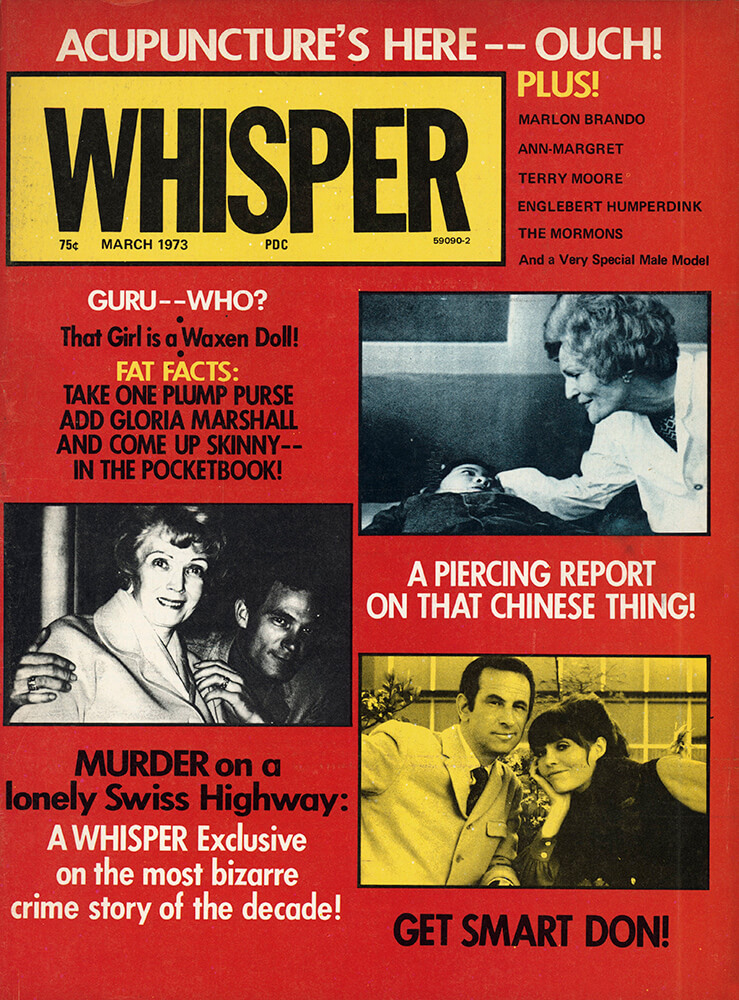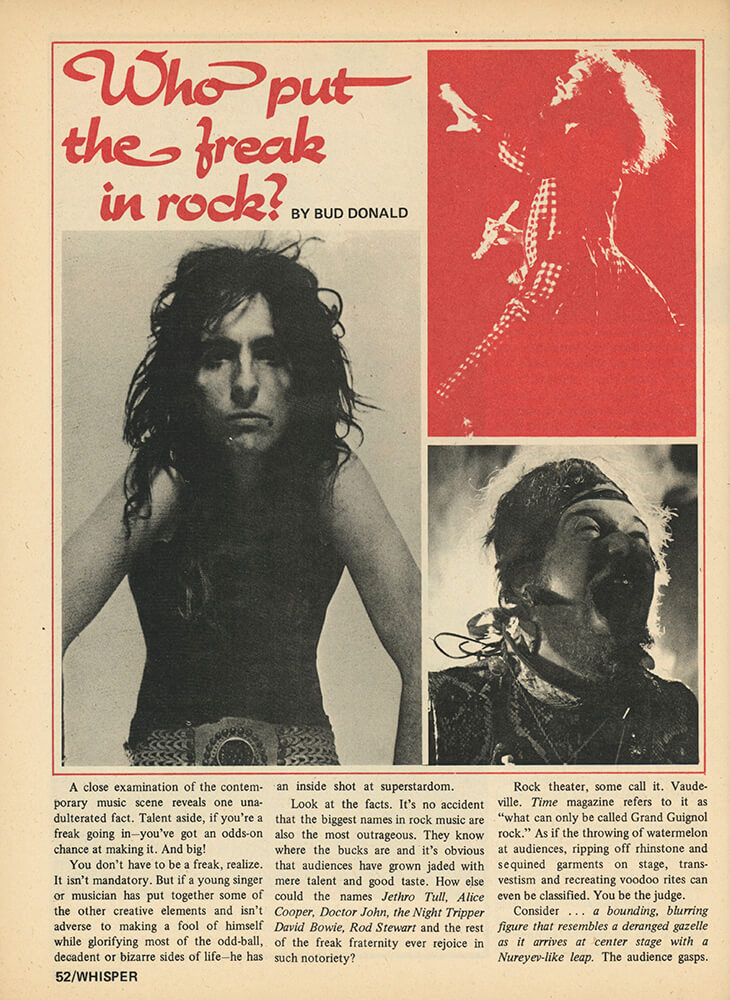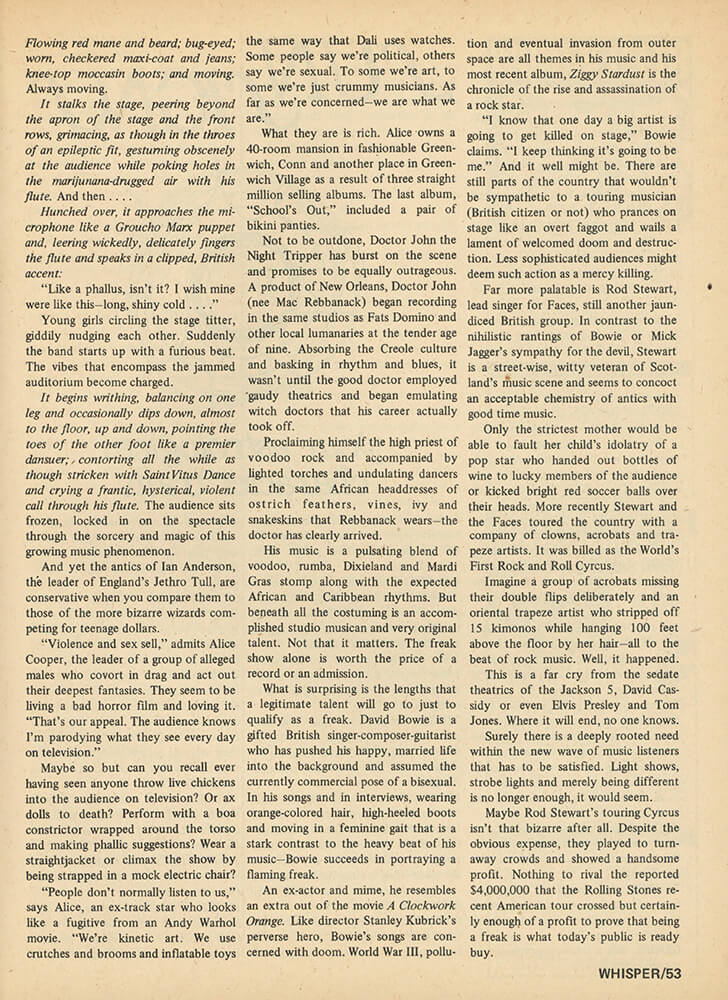Article Database
Who Put the Freak in Rock?
A close examination of the contemporary music scene reveals one unadulterated fact. Talent aside, if you're a freak going in — you've got an odds-on chance at making it. And big!
You don't have to be a freak, realize. It isn't mandatory. But if a young singer or musician has put together some of the other creative elements and isn't adverse to making a fool of himself while glorifying most of the odd-ball decadent or bizarre sides of life — he has an inside shot at superstardom.
Look at the facts. It's no accident that the biggest names in rock music are also the most outrageous. They know where the bucks are and it's obvious that audiences have grown jaded with mere talent and good taste. How else could the names Jethro Tull, Alice Cooper, Doctor Ohn, the Night Tripper David Bowie, Rod Stewart and the rest of the freak fraternity ever rejoice in such notoriety?
Rock theater, some call it. Vaudeville. Time magazine refers to it as "what can only be called Grand Guignol rock." As if the throwing of watermelon at audiences, ripping off rhinestone and sequined garments on stage, transvestism and recreating voodoo rites can ever be classified. You be the judge.
Consider... a bounding, blurring figure that resembles a deranged gazelle as it arrives at center stage with a Nureyev-like leap. The audience gasps. Flowing red mane and beard; bug-eyed; worn, checkered maxi-coat and jeans; knee-top moccasin boots; and moving. Always moving.
It stalks the stage, peering beyond the apron of the stage and the front rows, grimacing, as though in the throes of an epileptic fit, gesturning obscenely at the audience while poking holes in the marijunana-drugged air with his flute. And then...
Hunched over, it approaches the microphone like a Groucho Marx puppet and, leering wickedly, delicately fingers the flute and speaks in a clipped, British accent:
"Like a phallus, isn't it? I wish mine were like this — long, shiny cold..."
Young girls circling the stage titter, giddily nudging each other. Suddenly the band starts up with a furious beat. The vibes that encompass the jammed auditorium become charged.
It begins writhing, balancing on one leg and occasionally dips down, almost to the floor, up and down, pointing the toes of the other foot like a premier danseur; contorting all the while as though stricken with Saint Vitus Dance and crying a frantic, hysterical, violent call through his flute. The audience sits frozen, locked in on the spectacle through the sorcery and magic of this growing music phenomenon.
And yet the antics of Ian Anderson, the leader of England's Jethro Tull, are conservative when you compare them to those of the more bizarre wizards competing for teenage dollars.
"Violence and sex sell," admits Alice Cooper, the leader of a group of alleged males who covort in drag and act out their deepest fantasies. They seem to be living in a bad horror film and loving it. "That's our appeal. The audience knows I'm parodying what they see every day on television."
Maybe so but can you recall ever having seen anyone throw live chickens into the audience on television? Or ax dolls to death? Perform with a boa constrictor wrapped around the torso and making phallic suggestions? Wear a straightjacket or climax the show by being strapped in a mock electric chair?
"People don't normally listen to us," says Alice, an ex-track star who looks like a fugitive from an Andy Warhol movie. "We're kinetic art. We use crutches and brooms and inflatable toys the same way that Dali uses watches. Some people say we're political, others say we're sexual. To some we're art, to some we're just crummy musicians. As far as we're concerned — we are what we are."
What they are is rich. Alice owns a 40-room mansion in fashionable Greenwich, Conn and another place in Greenwich Village as a result of three straight million selling albums. The last album, "School's Out," included a pair of bikini panties.
Not to be outdone, Doctor John the Night Tripper has burst on the scene and promises to be equally outrageous. A product of New Orleans, Doctor John (nee Mac Rebbanack) began recording in the same studios as Fats Domino and other local luminaries at the tender age of nine. Absorbing the Creole culture and basking in rhythm and blues, it wasn't until the good doctor employed gaudy theatrics and began emulating witch doctors that his career actually took off.
Proclaiming himself the high priest of voodoo rock and accompanied by lighted torches and undulating dancers in the same African headdresses of ostrich feathers, vines, ivy and snakeskins that Rebbanack wears — the doctor has clearly arrived.
His music is a pulsating blend of voodoo, rumba, Dixieland and Mardi Gras stomp along with the expected African and Caribbean rhythms. But beneath all the costuming is an accomplished studio musician and very original talent. Not that it matters. The freak show alone is worth the price of a record or an admission.
What is surprising is the lengths that a legitimate talent will go to just to qualify as a freak. David Bowie is a gifted British singer-composer-guitarist who has pushed his happy, married life into the background and assumed the currently commercial pose of a bisexual. In his songs and in interviews, wearing orange-colored hair, high-heeled boots and moving in a feminine gait that is a stark contrast to the heavy beat of his music — Bowie succeeds in portraying a flaming freak.
An ex-actor and mime, he resembles an extra out of the movie A Clockwork Orange. Like director Stanley Kubrick's perverse hero, Bowie's songs are concerned with doom. World War III, pollution and eventual invasion from outer space are all themes in his music and his most recent album, Ziggy Stardust is the chronicle of the rise and assassination of a rock star.
"I know that one day a big artist is going to get killed on stage," Bowie claims. "I keep thinking it's going to be me." And it well might be. There are still parts of the country that wouldn't be sympathetic to a touring musician (British citizen or not) who prances on stage like an overt faggot and wails a lament of welcomed doom and destruction. Less sophisticated audiences might deem such action as a mercy killing.
Far more palatable is Rod Stewart, lead singer for Faces, still another jaundiced British group. In contrast to the nihilistic rantings of Bowie or Mick Jagger's sympathy for the devil, Stewart is a street-wise, witty veteran of Scotland's music scene and seems to concoct an acceptable chemistry of antics with good time music.
Only the strictest mother would be able to fault her child's idolatry of a pop star who handed out bottles of wine to lucky members of the audience or kicked bright red soccer balls over their heads. More recently Stewart and the Faces toured the country with a company of clowns, acrobats and trapeze artists. It was billed as the World's First Rock and Roll Cyrcus.
Imagine a group of acrobats missing their double flips deliberately and an oriental trapeze artist who stripped off 15 kimonos while hanging 100 feet above the floor by her hair-all to the beat of rock music. Well, it happened.
This is a far cry from the sedate theatrics of the Jackson 5, David Cassidy or even Elvis Presley and Tom Jones. Where it will end, no one knows.
Surely there is a deeply rooted need within the new wave of music listeners that has to be satisfied. Light shows, strobe lights and merely being different is no longer enough, it would seem.
Maybe Rod Stewart's touring Cyrcus isn't that bizarre after all. Despite the obvious expense, they played to turn away crowds and showed a handsome profit. Nothing to rival the reported $4,000,000 that the Rolling Stones recent American tour crossed but certainly enough of a profit to prove that being a freak is what today's public is ready buy.






